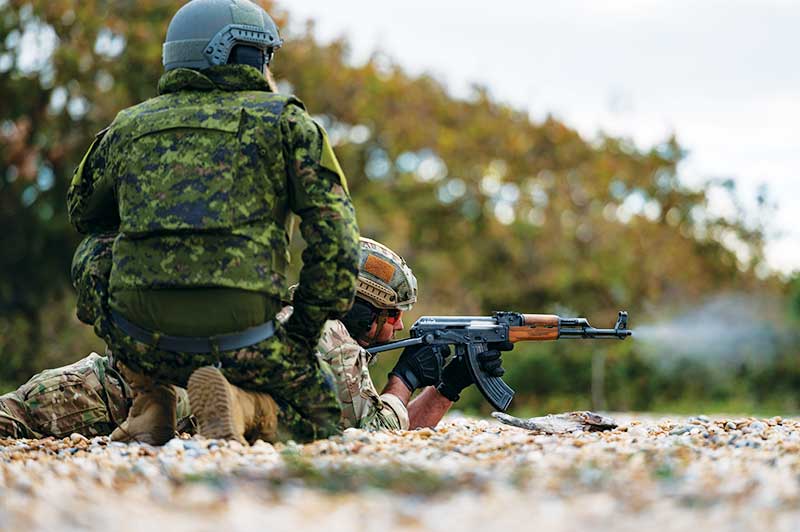
Soldiers of the 3rd Battalion, Princess Patricia’s Canadian Light Infantry, train Ukrainian recruits in the U.K. in fall 2022 [Corporal Eric Greico/CAF/Combat Camera]
As Canadians prepared for Thanksgiving this past fall, the Chief of the Defence Staff, General Wayne Eyre, issued a dire warning to his troops: for the next several months, possibly even years, the Canadian Armed Forces had to halt all non-essential activities.
The number of Canada’s full time military personnel—air force, navy and army personnel—had fallen 10,000 below peacetime establishment, let alone additional numbers that might be required for Canada to contribute to any international response force.
Eyre’s words echoed those of Richard Fadden, former national security adviser to the House of Commons defence committee shortly after Hurricane Fiona struck Atlantic Canada in the third week of September. The hurricane came directly ashore and wreaked untold damage with high winds, torrential rains and storm surges.
Ottawa dispatched about 300 troops to Newfoundland, Nova Scotia and Prince Edward Island to help in the recovery effort. The CAF is the only organization in Canada authorized to provide aid to civil authorities in the event of wildfires, floods, ice storms, hurricanes or any other public emergency. The reason is simple: the military carries its own communications, reconnaissance and specialized equipment that municipal or provincial governments rarely have. It has its own chain of command, and is trained to deploy quickly and operate effectively with almost no time wasted. That is its nature, whether in times of war or heightened international crises. Plus, Canada has no national guard that provincial premiers might call on to help respond to natural disasters.
The Canadian militia (reserves) answers only to Ottawa. Three provinces have provincial police, but their departments, or fire or forestry services, are too small for major emergencies.
The dispatch of thousands of trained soldiers over the years has put a significant drain on the military, which focuses on training when it’s not deployed. On average, it takes at least a year to train a Canadian soldier today and more for other military specializations, such as a pilot, combat engineer or communications specialist. Every moment fighting a wildfire takes away from that training. With the current numbers of CAF personnel, it’s no wonder that General Eyre is worried.
Why are CAF numbers so low and recruitment so poor? One reason is unless Canadians are told repeatedly by governments, the press, social media, etc., how important the country’s defence is, young men and women will not normally join. And since the war in Afghanistan, Canadians at large have basically ignored the need for a strong defence.
The federal government pays attention to dental care, guns, the climate, plastic bags and straws, but barely mentions the importance of preparing an adequate defence.
For example, a recent conference held by the Globe and Mail listed climate, reconciliation, economic growth and other issues as ones Canadians must pay attention to, but there was no word about defence.
When Russia invaded Ukraine in February 2022, there were a few speeches by government ministers about the need to be vigilant, and help Ukraine, but little else about Canada’s need to mobilize as it did in the days of the Korean War and the early Cold War. Radio talk shows, podcasts, public forums, rallies, newspaper spreads, the internet and social media hardly ever mention the need to strengthen the military.
The federal government pays attention to dental care, guns, the climate, plastic bags and straws, but barely mentions the importance of preparing an adequate defence. It’s no surprise that young Canadians, and Canadians in general, do not have defence on their radars.
As the war in Ukraine drags on, killing thousands of civilians, and the threat of Russian tactical nukes grows, Canadians seem more worried about the cost of gas.
Canada should be playing a major role in preventing the next war by building a credible deterrent with its allies to ensure war does not engulf us all. Canadians, in their complacency, have forgotten that.
Advertisement






















